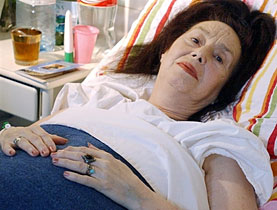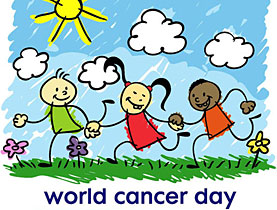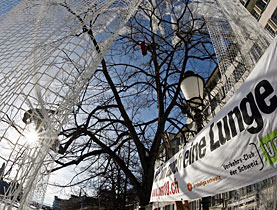Air pollution harms unborn babies

Too many dust particles in the air can damage the development of a foetus' lungs, according to Swiss scientists.
Until now it was thought that pollution did not affect children’s breathing until they were of school age.
“If our hypothesis is correct, early influences on respiratory passages lead to a rise in the number of lung diseases and to a shorter life expectancy,” said scientists from Bern University on Tuesday.
The study was presented at the congress of the European Respiratory Society in Berlin.
Philipp Latzin and colleagues from the department of paediatrics at Bern University measured the quality of the air breathed by 241 pregnant women, analysing the levels of ozone, nitrogen dioxide and dust particles smaller than ten micrometres, referred to as PM10.
In adults the harmful effects of inhaling dust particles – caused by diesel emissions from cars among other things – include asthma, lung cancer, cardiovascular issues and premature death.
The researchers also looked at how far the expectant mothers lived from main roads and, five weeks after the women gave birth, they measured the breathing of the newborns as they slept.
The study found that high levels of air pollution during pregnancy resulted in changes in breathing rate. Babies of mothers who lived near main roads breathed faster than those who didn’t: 48 times a minute compared with 42.
This was a particular problem for those babies diagnosed with breathing problems anyway, according to the researchers.
In addition, babies of mothers who were exposed to pollution during the third trimester of pregnancy showed a tendency to develop inflamed respiratory passages.
Blood flow
The scientists said they could not yet fully explain the findings, but Latzin suspected the pollution damages the mother’s lungs and then reduces the blood flow to the placenta.
The placenta transfers nutrients and oxygen from the mother to the foetus and waste products and carbon dioxide back from the foetus to the mother. Less blood flow would mean fewer nutrients for the foetus.
Another theory is that the pollutants get into the foetus’s blood and affect its breathing rate.
Latzin also said changes in the mother’s metabolism could block growth factors and possibly damage the development of the child’s pulmonary alveoli, the primary sites of gas exchange with the blood.
Swiss pollution
The researchers say the findings prove that the permitted levels of air pollution needed to be lowered.
Last year the National Air Pollution Monitoring Network said urgent action was required to significantly reduce emissions of nitrogen dioxide, volatile organic compounds (VOCs), respirable fine particles and carcinogenic diesel particles and ammonia.
High values of nitrogen dioxide were measured mostly along motorways near Switzerland’s biggest cities. There were 11 days in 2006 when concentrations were above 80 micrograms per cubic metre, nearly three times permitted levels (30ug/m3).
Urban areas were also affected by dangerous levels of fine particles. The average for 2006 was between 23 and 28ug/m3, even though Switzerland’s air pollution control policy sets the bar at 20ug/m3. And about every five or six days, concentrations were above 50ug/m3, going as high as 176ug/m3.
Ozone levels were comparable with averages of the past ten years. A recent study found that 80 per cent of the ozone affecting regions north of the Alps is blown in from abroad.
swissinfo with agencies
Number of children per woman in Switzerland (2006): 1.44 (1964: 2.7).
Currently foreign women have more children: 1.9 per woman vs. 1.3 children per Swiss woman.
Mean age of childbirth (in years): 30.4 years.
The average age for women seeking IVF treatment at one of Switzerland’s 24 fertility clinics is 36.
The birth rate went up slightly during 2007 by 1.1% to 74,500.
In humans, prenatal development can be divided into two stages: the embryonic stage runs from the moment of fertilisation until the end of the eighth week of development (tenth week of gestation); the foetal stage then continues until birth.
The foetus is not as sensitive to damage from environmental exposures as the embryo, though toxic exposures can often cause physiological abnormalities or minor congenital malformation.
Alcohol consumption may increase the risk of foetal alcohol syndrome, which can lead to mental retardation. Smoking during pregnancy may lead to reduced birth weight, which can be connected to secondary medical problems.
Diet is especially important in the early stages of development. Supplementation of the mother’s diet with folic acid reduces the risk of spina bifida and other neural tube defects. Skipping breakfast could also lead to extended periods of lower than normal nutrients in the mother’s blood, leading to a higher risk of prematurity.

In compliance with the JTI standards
More: SWI swissinfo.ch certified by the Journalism Trust Initiative



You can find an overview of ongoing debates with our journalists here. Please join us!
If you want to start a conversation about a topic raised in this article or want to report factual errors, email us at english@swissinfo.ch.